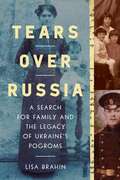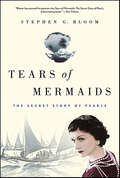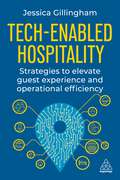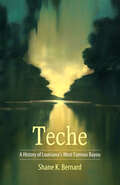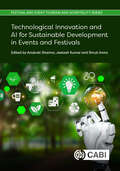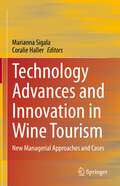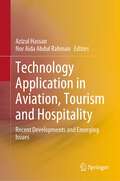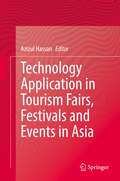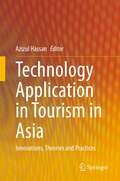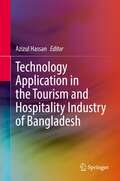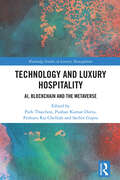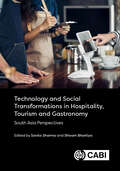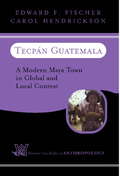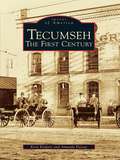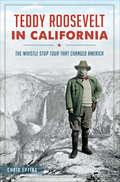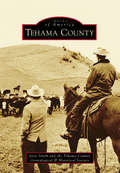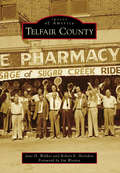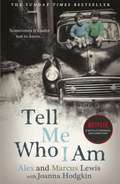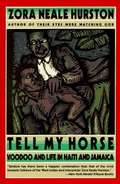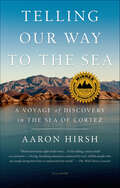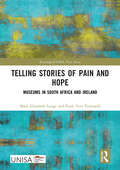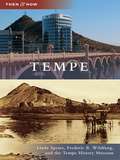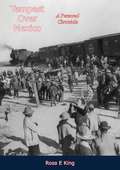- Table View
- List View
Tears Over Russia: A Search for Family and the Legacy of Ukraine's Pogroms
by Lisa BrahinA sweeping saga of a family and community fighting for survival against the ravages of history.Set between events depicted in Fiddler on the Roof and Schindler&’s List, Lisa Brahin&’s Tears over Russia brings to life a piece of Jewish history that has never before been told. Between 1917 and 1921, twenty years before the Holocaust began, an estimated 100,000 to 250,000 Jews were murdered in anti-Jewish pogroms across the Ukraine. Lisa grew up transfixed by her grandmother Channa&’s stories about her family being forced to flee their hometown of Stavishche, as armies and bandit groups raided village after village, killing Jewish residents. Channa described a perilous three-year journey through Russia and Romania, led at first by a gallant American who had snuck into the Ukraine to save his immediate family and ended up leading an exodus of nearly eighty to safety. With almost no published sources to validate her grandmother&’s tales, Lisa embarked on her incredible journey to tell Channa&’s story, forging connections with archivists around the world to find elusive documents to fill in the gaps of what happened in Stavishche. She also tapped into connections closer to home, gathering testimonies from her grandmother&’s relatives, childhood friends and neighbors. The result is a moving historical family narrative that speaks to universal human themes—the resilience and hope of ordinary people surviving the ravages of history and human cruelty. With the growing passage of time, it is unlikely that we will see another family saga emerge so richly detailing this forgotten time period. Tears Over Russia eloquently proves that true life is sometimes more compelling than fiction.
Tears of Mermaids: The Secret Story of Pearls
by Stephen G. BloomA round, luminescent pearl is the simplest and most perfect gem. Columbus sought—and found—this precious jewel coveted by his Spanish sovereigns, sparking popularity throughout Europe. Fashion icons Jacqueline Kennedy, Princess Grace, and Michelle Obama cherished them, making them iconic. And designer Coco Chanel raised them to new heights, bringing pearls— fake and real—to women everywhere. In Tears of Mermaids, Stephen G. Bloom travels 30,000 miles in an effort to trace a single pearl—from the moment a diver off the coast of Australia scoops an oyster containing a single luminescent pearl from the ocean floor to the instant a woman fastens the clasp of a strand containing the same orb. Bloom chronicles the never-before-told saga of the global pearl trade by gaining access to clandestine outposts in China, the Philippines, French Polynesia and Australia. He infiltrates high-tech pearl farms guarded by gun-toting sentries, farms for pearls in rural China, and even goes backstage at Christie's for a fast and furious auction of the most expensive pearl ever sold. Teeming with rogue humor and uncanny intelligence, Tears of Mermaids weaves a nonstop detective story whose main character is the world's most enduring jewel.
Tech-Enabled Hospitality: Strategies to Elevate Guest Experience and Operational Efficiency
by Jessica GillinghamWhile the hotel and short term rental sectors are growing, there is a technology divide between operators using technology strategically to run better operations and those that are not. Hospitality professionals need to understand their businesses' pain points to better invest in technology solutions and transform their businesses to be more profitable, and in some cases, more personal. Tech-enabled Hospitality looks at how the intersection of technology and personalized service can redefine the future of hospitality, including for large chains and small and medium-sized enterprises (SMEs) in the lodging sector. With its focus on practical applications of technology for enhancing both operational efficiency and guest experiences, this book is a valuable resource for those looking to modernize their hospitality business without losing the essence of personal touch. Through real-world examples and in-depth expert interviews from brands such as Stripe, SiteMinder and Rocco Forte, this book explores hospitality functions such as hotel management, operations, revenue management, sustainability, IoT, access control, guest communications, payment processing, guest experience, virtual concierge and AI tools. This book will help hospitality professionals better understand the hows and whys of implementing technology to run everyday aspects of a hospitality business while still leaving room, if desired, to provide a uniquely human experience that underpins true 'hospitality'.
Teche: A History of Louisiana's Most Famous Bayou (America's Third Coast Series)
by Shane K. BernardRecipient of a 2017 Book of the Year Award presented by the Louisiana Endowment for the HumanitiesShane K. Bernard's Teche examines this legendary waterway of the American Deep South. Bernard delves into the bayou's geologic formation as a vestige of the Mississippi and Red Rivers, its prehistoric Native American occupation, and its colonial settlement by French, Spanish, and, eventually, Anglo-American pioneers. He surveys the coming of indigo, cotton, and sugar; steam-powered sugar mills and riverboats; and the brutal institution of slavery. He also examines the impact of the Civil War on the Teche, depicting the running battles up and down the bayou and the sporadic gunboat duels, when ironclads clashed in the narrow confines of the dark, sluggish river.Describing the misery of the postbellum era, Bernard reveals how epic floods, yellow fever, racial violence, and widespread poverty disrupted the lives of those who resided under the sprawling, moss-draped live oaks lining the Teche's banks. Further, he chronicles the slow decline of the bayou, as the coming of the railroad, automobiles, and highways reduced its value as a means of travel. Finally, he considers modern efforts to redesign the Teche using dams, locks, levees, and other water-control measures. He examines the recent push to clean and revitalize the bayou after years of desecration by litter, pollutants, and invasive species. Illustrated with historic images and numerous maps, this book will be required reading for anyone seeking the colorful history of Louisiana and the Gulf Coast.As a bonus, the second part of the book describes Bernard's own canoe journey down the Teche's 125-mile course. This modern personal account from the field reveals the current state of the bayou and the remarkable people who still live along its banks.
Technological Innovation and AI for Sustainable Development in Events and Festivals (Festival and Event Tourism and Hospitality Series)
by Anukrati Sharma Jeetesh Kumar Shruti AroraFrom sustainable event planning to the influence of VR, AI, and mobile applications on tourist behaviour, this book explores the dynamic landscape where innovation meets tradition. It studies the intersection of green technologies, sustainable infrastructure, and the delicate balance between cutting-edge tools and the intrinsic emotional aspects of human engagement. Aligned with the United Nations' 17 Sustainable Development Goals, the book highlights AI's potential to drive meaningful contributions to a sustainable future. It anticipates the imminent transformation of festivals and events through technological innovation and AI implementation. It will allow the reader to gain insights into how automation streamlines logistics, optimizes marketing efforts, and enhances the overall attendee experience. The book offers readers: · A cutting-edge exploration of the transformative impact of technologies and artificial intelligence on the events and tourism industries. · Oversight of how new technology can align with the United Nations' 17 Sustainable Development Goals - readers can anticipate insights into how AI can contribute meaningfully to understanding and addressing pressing global challenges. · Practical insights for stakeholders including actionable insights that go beyond theory. It will be an essential reference for academic researchers and practitioners within events and tourism management.
Technology Advances and Innovation in Wine Tourism: New Managerial Approaches and Cases
by Marianna Sigala Coralie HallerThis book consolidates under one roof the latest research investigating the various technological advances and new managerial approaches driving innovation within wine tourism. Competition in wine tourism intensifies at a global scale, while wine tourism demand continuously evolves, diversifies and becomes more sophisticated. The book highlights that innovation and technology exploitation have become not only a way to differentiate but also a survival necessity for wine tourism operators and wine destinations alike.This book includes cutting edge research about the latest technological developments and advances that revolutionise the wine tourism sector and transform the way wine tourism experiences are designed and delivered. In addition, the book includes case studies and research findings showing how wine tourism operators and destinations can nurture, support and implement innovation at various levels, including the experience, the process, the business model and/or the ecosystem level.
Technology Application in Aviation, Tourism and Hospitality: Recent Developments and Emerging Issues
by Azizul Hassan Nor Aida Abdul RahmanThis book covers multiple areas such as technology and the type of application in aviation, tourism and hospitality with looking at current and future technology application, as well as in a rural tourism perspective. The strength of this book comes from the authors themselves coming from multiple higher institutions in Malaysia and Indonesia as these two countries are the top two countries in Southeast Asia with the world's most popular tourist destinations and for a reason: a tropical climate, rich culture, gorgeous beaches, wonderful food and low prices. This book is also packed with detailed knowledge in the area of air travel, as well as deep understanding on the related theories used as theoretical underpin in performing air travel research. This book provides insightful discussion and very beneficial to the reader. This book is suitable for the following readers: general, students, travelers, academics, tourism consultants, aviation regulators, aviation practitioners and ministries of tourism. Readers are also exposed to recent issues and development pertaining technology application in aviation tourism and hospitality, theoretical discussion related to technology application as well as its application and future research application.
Technology Application in Tourism Fairs, Festivals and Events in Asia
by Azizul HassanIt is an unconditional reality that the tourism industry in Asia is becoming exposed to innovative technologies more than ever before. This book reports the latest research in the application of innovative technology to the tourism industry, covering the perspectives, innovativeness, theories, issues, complexities, opportunities and challenges affecting tourism in Asia. A blend of comprehensive and extensive efforts by the contributors and editors, it is designed especially to cover technology applications in tourism fairs, festivals and events in Asia. The application and practice of technologies in tourism, including the relevant niches of fairs, festivals and events are also covered, with a focus on the importance of technology in tourism. This book highlights, in a comprehensive manner, technologies that are impacting the tourism industry in Asia, as well as the constraints it is facing. It deals with distinct topics, such as tourism promotion, technology-driven sustainable tourism development, social media, accessibility and so on to cover fairs, festivals and events. This book is a significant contribution towards the very limited knowledge in this identified research area, with examples from selected Asian countries. This book is designed to accommodate both qualitative and quantitative research linking theory and practice. This book has a clear focus on outlining the research issues. Each chapter of the book highlights a methodology that was used, with rationale for its use. This book addresses a number of revisions that unify the theme or framework to integrate the chapters.
Technology Application in Tourism in Asia: Innovations, Theories and Practices
by Azizul HassanThis book very specifically focuses on technology application in tourism in Asia. The book contains twenty-seven chapters in four sections (i.e., theories, innovations, practices, and future research directions), based on the intriguing qualities and importance of technology applications in the Asian tourism business. This book, a blend of comprehensive and extensive efforts by the contributors and editor, is designed to extensively cover technology applications in tourism in Asia, including distinct topics such as mobile computing, new product designs, innovative technology usages in tourism promotion, technology-driven sustainable tourism development, location-based apps, mobility, accessibility, the post crisis situation of COVID-19, etc. This book is a significant contribution towards the very limited knowledge of technology applications in tourism, with selected examples of Asian countries. The importance of technology in Asian tourism is rapidly increasing, and has led to a rise in luxury, allowing citizens to enjoy leisure travel over both long and short distances. The rise of low-cost airlines and the region’s growing, affluent middle class have changed the tourism environment dramatically. More tourists are booking their holidays online as a result of technological advancements. Online travel is the most important and well-established aspect of Asia's Internet economy. Considering the ongoing trend of technology applications in the tourism industry in Asia, more research attempts like this book need to be made aiming towards exploring diverse aspects. As tourism is an expanding area, this book can serve as a reading companion for tourism students, policy planners and industry professionals. This book is expected to be appreciated by expatriate researchers and researchers having a keen interest in the Asian tourism industry.
Technology Application in the Tourism and Hospitality Industry of Bangladesh
by Azizul HassanThe tourism and hospitality industry of Bangladesh as a South Asian country has potential. Sustainable development of this industry in this country is on the move. Still, there are some hindrances which appear to be stymieing this industry’s overall development potential. Overcoming such hindrances can be partly enabled by applying digital innovation and introducing more Internet based platforms in the country’s tourism and hospitality industry. The country is believed to have emphasized innovative technology application in this industry, but technology applications in this industry in Bangladesh have so far attracted very few researchers, resulting in insufficient contributions and very limited knowledge.This book, therefore, can make a significant contribution towards the very limited knowledge in this identified research area. On the specific ground of technology application in the tourism and hospitality industry, the book covers concepts and context, the present scenario, product and service offers, and an analysis of the roles of public and private institutions. On related issues, the book also covers social media, networking and connectivity; sustainability practices and climate change effects; tourist experiences; developments; and challenges, suggestions, and future research directions. The book is expected to appeal to general readers, as well as researchers with an interest in technology applications in the tourism and hospitality industry. This book is also an essential read for the relevant policy planners and industry professionals.
Technology and Luxury Hospitality: AI, Blockchain and the Metaverse (Routledge Studies in Luxury Management)
by Pethuru Raj Chelliah Park Thaichon Sachin Gupta Pushan Kumar DuttaThe integration of pioneering information and communication technologies has transformed the hospitality sector. This groundbreaking book delves into the transformative power of cutting-edge technologies in the world of high-end travel and accommodation. As the digital revolution continues to reshape our lives, this book offers an exclusive look at how the hospitality industry is adapting and evolving to cater to the sophisticated tastes of the modern, tech-savvy traveller.In this eye-opening exploration, readers will be taken on a journey through the latest innovations in artificial intelligence, blockchain, and the metaverse as they intersect with the world of luxury hospitality. From AI-driven concierge services and smart hotel rooms that cater to guests' every whim to the democratization of luxury experiences through blockchain-based loyalty programmes and the rise of virtual reality travel, this book reveals the extraordinary possibilities that lie ahead for the discerning traveller.With insights from international experts, this edited collection provides a comprehensive and engaging overview of the current and future trends shaping the industry and will be valuable to scholars and postgraduate researchers across the hospitality sector, innovation, and luxury management.
Technology and Social Transformations in Hospitality, Tourism and Gastronomy: South Asia Perspectives
by Amit Kumar Sanjeev Kumar Amandeep Khurana Omar Abdullah Kamlesh Attri Vaibhav Bhatt Sonali Chhetri R K Dhodi Rashmi Dhodi Afsheen Hassan Fatemeh Shah Hosseini Suneel Kumar Varinder Kumar Rekha Maitra Zahra Nadalipour Teena Pareek Bindu Roy Dilraj Singh Shadev Sidharth Srivastava Tahir Sufi Kuldeep VermaThis book explores the relationship between technology and social transformation in tourism, hospitality and gastronomy. It presents research and case studies, elaborating on benchmark practices adopted by tourism and hospitality professionals. In recent years, technology has transformed the tourism and hospitality industry; the chapters in this book cover areas such as guest experience and service quality, as well as operational areas such as housekeeping and waste management. Further social transformation in tourism is a result of drivers such as a growing interest in gastronomy and the use of social media; this is covered in the first part of the book. The second part outlines how communities may learn from these events. With contributions from academics, entrepreneurs, destination managers and government officials from the South Asia region, this book offers a real insight in to these areas of growing interest and provide a useful resource for those researching and studying within the areas of tourism development and hospitality.
Tecpan Guatemala
by Edward F Fischer Carol HendricksonThis case study of a highland Guatemala town examines what it means to be Maya in a rapidly changing and globalized world. In providing an historical synopsis of the Kaqchikel Maya from pre-Columbian and Colonial times to the present day, this volume focuses on the dynamics of clutural boundaries in light of the use of the Kaqchikel language versus Spanish, the growing role of Protestantism and the revitalization of Maya religion versus Catholicism, and the effects of violent civil war on social networks. It examines the role of weaving and export agriculture in linking Tecpanecos to larger economic and political orbits and for defining local, regional, and national identities. As a result, this accessibly written book demonstrates that even seemingly traditional Maya cultural forms are actively constructed in the context of intense global connections.
Tecumseh: The First Century
by Amanda Payeur Kern KuipersTecumseh was founded by a family of pioneers. The principals in the venture were Musgrove Evans with his wife, Abi Evans (n©e Brown), Abi's brother, Joseph Brown, and Austin E. Wing, a cousin of the Brown family. Joseph and Abi had firsthand knowledge of pioneer life, having established Brownville in Jefferson County, New York, with their father, Jacob Brown. Austin E. Wing was already in Michigan, living in Monroe, and he convinced Musgrove that the new settlement would be a noble and profitable venture. Musgrove convinced his brother-in-law, Joseph, and the three formed a company with the purpose of purchasing land and founding a community in the interior of Michigan. Upon arrival, a number of the first settlers were taking lunch while building the first structure, a 20-by-20 footlog "company house" to be shared by all until they could each build their own houses , and Musgrove Evans suggested naming the town after the Shawnee chief Tecumseh. There was some debate, especially as Tecumseh had fought on the side of the British, but it was decided that he had truly fought for his convictions and for his people, so the name was decided upon.
Teddy Roosevelt in California: The Whistle Stop Tour That Changed America
by Chris EptingThe camping trip taken by the &“conservationist president&” that put America&’s national parks on the map—from the award-winning author of Roadside Baseball. During his whirlwind 1903 tour of the western states, President Theodore Roosevelt paid his first visit to California. In between the appearances and pageantry, he embarked on three days of epic adventure in the wilderness of Yosemite with the famous and influential naturalist John Muir. A lover of the rugged outdoors, Roosevelt was humbled and impressed by the camping trip, which proved to be one of the most important sojourns in presidential history. Through firsthand accounts, speeches and rare photographs, author Chris Epting tells the story of a great and profound journey that had a lasting effect on conservation history and the National Park System.
Tehama County: 150 Years Of Photos And History (Images of America)
by Josie Smith Tehama County Genealogical Historical SocietyTehama County--its name is a mystery but its sense of place is not. The county portrays a friendly Norman Rockwell-like America, with everything from May Day picnics and parades to fall harvests, rugged lumbermen, tough cowboys, and rodeo roundups. Carved out of three Northern California counties in 1856, Tehama County is largely rural, with fertile open spaces dominated by ranching and agriculture. To the east and west are lofty mountains and deep-set canyons sculpted by fast-moving streams to delight recreationists. These streams tumble into the mighty Sacramento River that courses through the middle of the county on its way to the Pacific Ocean. While rural, Tehama County has a rich and colorful heritage reflected in its people. Some of the more notable residents have included Ishi, a Yahi Indian considered the last of his people; William B. Ide, commander in chief of the brief Bear Flag Republic; and railroad magnate and governor of California, Leland Stanford, who built the largest vineyard and brandy distillery in the world here.
Telfair County
by Jim Wooten Jane H. Walker Robert E. HerndonCreek Indians inhabited land that was to become Telfair County. The early population was made up of settlers of Scottish descent. They had to produce almost everything they used, from food to equipment. Named for Edward Telfair, a two-term governor of Georgia, the county was formed in 1807 from a portion of Wilkinson County. Gradually, several counties were formed from parts of Telfair. Since 1870, Telfair County has kept its current boundaries. The original county seat was located in Jacksonville, about 20 miles south of McRae, Georgia, where it was moved by the legislature in 1871. While Georgia was a hotbed of secession, Telfair County representatives to the Secession Convention in 1861 voted "no" to the resolution, reflecting the sentiment of the county's population. Even though there was strong objection to secession, many Telfair County citizens did their duty and volunteered to serve the Southern cause.
Tell Me Something: What do you do when the life you always wanted disappears?
by Adele ParksIn this addictive novel, from the No. 1 Sunday Times bestselling author of Just My Luck, a marriage crumbles, cultures clash and love affairs begin in in glorious sun-drenched Italy.Don't miss Adele's gripping new novel, the Sunday Times bestseller Both of You, out now!Acclaim for Adele's compelling, twisty and acutely observed novels: 'Tightly plotted, brilliantly conceived and totally gripping' Lisa Jewell'Twisty, unputdownable and utterly engrossing' Jenny Colgan 'Brilliant storyline, great characters, very clever, loved it!' B A Paris 'Addictive and perceptive' Lucy AtkinsWILL THE ITALIAN DREAM BE WHAT SHE'S ALWAYS IMAGINED?Elizabeth has two goals in life. Once she fulfils the first - finding a sexy Italian husband - she thinks the second will come easy. But getting pregnant is proving difficult.So when the couple move to Italy for Roberto to run the family business, Elizabeth hopes the relaxing lifestyle will boost her chances of conceiving.But Italy is anything but peaceful...Elizabeth's wily mother-in-law seems to instantly hate her, Roberto's gorgeous ex is lingering a little too close for comfort... And. Still. No. Baby.Will Elizabeth's hunger for a bambino be enough to hold her marriage together? Or will she find herself dreaming of something else all together?What readers are saying about Tell Me Something:'The story is a rollercoaster ride full of ups and downsfor Elizabeth, and Parks' clever and unpredictable twists and turnsare thoroughly enjoyable' 'Elizabeth's character is highly developed and expertly portrayed. It's been a while since I read a book which made me laugh and cry simultaneously, for being both happy and sad'More praise for Adele Parks: Dark, funny and observant' Cosmopolitan 'Guaranteed to keep you hooked until the end' She magazine 'Deliciously down to earth' The Times 'Wonderfully absorbing' Stylist 'Will captivate you from the first page' Closer
Tell Me Something: What do you do when the life you always wanted disappears?
by Adele ParksIn this addictive novel, from the No. 1 Sunday Times bestselling author of Lies Lies Lies, a marriage crumbles, cultures clash and love affairs begin in in glorious sun-drenched Italy.Don't miss Adele's gripping new novel, the No. 1 bestseller Just My Luck, out now!Acclaim for Adele's compelling, twisty and acutely observed novels: 'Tightly plotted, brilliantly conceived and totally gripping' Lisa Jewell 'Twisty, unputdownable and utterly engrossing' Jenny Colgan 'Brilliant storyline, great characters, very clever, loved it!' B A Paris 'Addictive and perceptive' Lucy AtkinsWILL THE ITALIAN DREAM BE WHAT SHE'S ALWAYS IMAGINED?Elizabeth has two goals in life. Once she fulfils the first - finding a sexy Italian husband - she thinks the second will come easy. But getting pregnant is proving difficult.So when the couple move to Italy for Roberto to run the family business, Elizabeth hopes the relaxing lifestyle will boost her chances of conceiving.But Italy is anything but peaceful...Elizabeth's wily mother-in-law seems to instantly hate her, Roberto's gorgeous ex is lingering a little too close for comfort... And. Still. No. Baby.Will Elizabeth's hunger for a bambino be enough to hold her marriage together? Or will she find herself dreaming of something else all together?What readers are saying about Tell Me Something:'The story is a rollercoaster ride full of ups and downs for Elizabeth, and Parks' clever and unpredictable twists and turns are thoroughly enjoyable' 'Elizabeth's character is highly developed and expertly portrayed. It's been a while since I read a book which made me laugh and cry simultaneously, for being both happy and sad'More praise for Adele Parks: Dark, funny and observant' Cosmopolitan 'Guaranteed to keep you hooked until the end' She magazine 'Deliciously down to earth' The Times 'Wonderfully absorbing' Stylist 'Will captivate you from the first page' Closer
Tell Me Who I Am: The Story Behind the Netflix Documentary
by Joanna Hodgkin Alex And Marcus LewisThe story behind the hit Netflix documentary: The bestselling account of the bond between brothers and the shocking legacy of a dangerous mother.Imagine waking up one day to discover that you have forgotten everything about your life. Your only link with the past, your only hope for the future, is your identical twin.Now imagine, years later, discovering that your twin had not told you the whole truth about your childhood, your family, and the forces that had shaped you. Why the secrets? Why the silences? You have no choice but to begin again.This has been Alex's reality: a world where memories are just the stories people tell you, where fact and fiction are impossible to distinguish. With dogged courage he has spent years hunting for the truth about his hidden past and his remarkable family. His quest to understand his true identity has revealed shocking betrayals and a secret tragedy, extraordinary triumph over crippling adversity and, above all, redemption founded on brotherly love.Marcus his twin brother has sometimes been a reluctant companion on this journey, but for him too it has led to staggering revelations and ultimately the shedding of impossible burdens. Their story spans continents and eras, from 1950s debutantes and high society in the Home Counties to a remote island in the Pacific and 90s raves. Disturbing, funny, heart-breaking and affirming, Alex and Marcus's determination to rebuild their lives makes us look afresh at how we choose to tell our stories.
Tell My Horse: Voodoo and Life in Haiti and Jamaica
by Zora Neale HurstonAs a first-hand account of the weird mysteries and horrors of voodoo, Tell My Horse is an invaluable resource and fascinating guide. Based on Zora Neale Hurston's personal experiences in Haiti and Jamaica, where she participated as an initiate rather than just an observer of voodoo practices during her visits in the 1930s, this travelogue into a dark world paints a vividly authentic picture of ceremonies and customs and superstitions of great cultural interest.
Telling Our Way to the Sea: A Voyage of Discovery in the Sea of Cortez
by Aaron HirshA luminous and revelatory journey into the science of life and the depths of the human experienceBy turns epic and intimate, Telling Our Way to the Sea is both a staggering revelation of unraveling ecosystems and a profound meditation on our changing relationships with nature—and with one another.When the biologists Aaron Hirsh and Veronica Volny, along with their friend Graham Burnett, a historian of science, lead twelve college students to a remote fishing village on the Sea of Cortez, they come upon a bay of dazzling beauty and richness. But as the group pursues various threads of investigation—ecological and evolutionary studies of the sea, the desert, and their various species of animals and plants; the stories of local villagers; the journals of conquistadors and explorers—they recognize that the bay, spectacular and pristine though it seems, is but a ghost of what it once was. Life in the Sea of Cortez, they realize, has been reshaped by complex human ideas and decisions—the laws and economics of fishing, property, and water; the dreams of developers and the fantasies of tourists seeking the wild; even efforts to retrieve species from the brink of extinction—all of which have caused dramatic upheavals in the ecosystem. It is a painful realization, but the students discover a way forward. After weathering a hurricane and encountering a rare whale in its wake, they come to see that the bay's best chance of recovery may in fact reside in our own human stories, which can weave a compelling memory of the place. Glimpsing the intricate and ever-shifting web of human connections with the Sea of Cortez, the students comprehend anew their own place in the natural world—suspended between past and future, teetering between abundance and loss. The redemption in their difficult realization is that as they find their places in a profoundly altered environment, they also recognize their roles in the path ahead, and ultimately come to see one another, and themselves, in a new light.In Telling Our Way to the Sea, Hirsh's voice resounds with compassionate humanity, capturing the complex beauty of both the marine world he explores and the people he explores it with. Vibrantly alive with sensitivity and nuance, Telling Our Way to the Sea transcends its genre to become literature.
Telling Stories of Pain and Hope: Museums in South Africa and Ireland (ISSN)
by Ruth Teer-Tomaselli Mary Elizabeth LangeThe histories of South Africa and Ireland have been tumultuous and traumatic. Both countries have experienced political repression, sectarian violence and oppression that still impact the spiritual well-being of people today. Their parallel histories are of colonialism, displacement and division, and a fight for land and sovereignty. Both countries have embarked on a process of healing and reconciliation, yet there is an ongoing struggle for reparation and/or reversal of previous injustices.Recognising that museums of the 21st century have the potential to contribute to catharsis and mutual understanding, this book reflects on selected museums in South Africa and Ireland that commemorate the pain of the past and the hope for the future. The primary focus of the book is the way in which museum guides, curators and managers share their stories and the stories of their ancestors, and the stories of other people’s ancestors who were caught up in the conflict while interweaving the stories of the authors as well.Print edition not for sale in Sub Saharan Africa.
Tempe
by Frederic B. Wildfang Linda Spears Tempe History MuseumCharles Trumbull Hayden built the first canal on the south side of the Salt River in 1870. Soon after, he built a store, a flour mill, and a cable ferry across the river, and he started a town. Since then, Tempe has changed from a small farming community to a lively urban center. Moreover, Tempe's residential growth has made it the seventh-largest town in Arizona. Author Frederic B. Wildfang documents the history. Photographer Linda Spears illustrates the changes.
Tempest Over Mexico: A Personal Chronicle (American Imperialism)
by Rosa E KingHere is a set of memoirs by an English lady, who went to the resort city of Cuernavaca in Morelos in 1905. After the death of her husband...by 1910 she had purchased a tourist hotel and catered to the Mexican leaders of the day who frequently resorted to the beautiful southern city.Soon there came on the horrors of the revolution which Mrs. King clearly shows to have been a clash between the fundamental rights of man and intolerable exploitation by a class themselves most attractive as friends and acquaintances. The leader of the south, Zapata, is frankly ranked only after Hidalgo and Juarez in the social emancipation of Mexico. His personal foibles are not mentioned but the significance of his movement is constantly emphasized...There is no effort to portray the causes behind the political moves of the day. In fact, all politics are so carefully avoided that even the famous last trip of Madero to Cuernavaca is left with a queerly inadequate explanation. The high point of the narrative is the two chapters devoted to the siege of the southern city and the three covering its evacuation and the tragic journey of the people to Toluca. This account is stark and so unreal as to leave the reader almost skeptical were it not for a force and detail and a local description that bear the stamp of fact. Throughout, the author's theme is: "The Zapatistas were not an army; they were a people in arms". Though the immediate results were ruin, death, and destruction, the writer firmly believes the revolution justified and that "strong nations the world over have been built on the ruins of a just revolt".Now, thirty years later, the author, broken in health and with property gone, has retired to live in her beloved Cuernavaca, sincerely loving the humble and the great of her adopted country.In short: A book of memoirs by a competent observer; and withal one that is intensely interesting both to layman and scholar.-W. H. CALLCOTT
